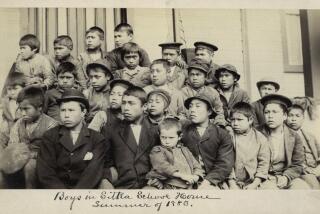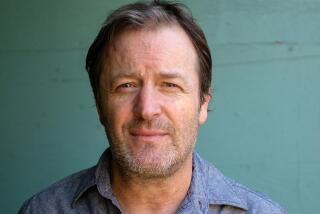Harry W. Lawton, 77; Was Author, Historian and Former Journalist
Harry W. Lawton, an author and historian whose nonfiction novel about a deadly manhunt for an American Indian fugitive wanted for murder nearly 100 years ago served as the basis for the 1969 movie “Tell Them Willie Boy Is Here,” has died. He was 77.
Lawton, a former journalist and retired lecturer and management-services officer at UC Riverside, died Nov. 20 in a Dana Point assisted-care facility after a long illness, said his family.
Lawton was a reporter for the Riverside Press-Enterprise in the 1950s when he first heard accounts of what has been called the “last great manhunt” of the Old West from Indians on the Morongo Indian Reservation.
In 1909, Willie Boy, a 28-year-old Paiute-Chemehuevi Indian, fell in love with Carlota Boniface, his 16-year-old distant cousin. Her father, William, a shaman known as Old Mike, forbade the marriage. Willie Boy shot Old Mike to death on a ranch in Banning, then fled with the girl. The couple stayed ahead of a posse for a dozen days as they circled and backtracked over nearly 600 miles of desert in 100-degree heat.
In the end -- the circumstances are disputed -- the girl was shot and killed and Willie Boy killed himself.
“Willie Boy: A Desert Manhunt,” Lawton’s 1960 nonfiction novel, was based on three years of research that included interviews with surviving posse members.
The book received the James D. Phelan Award in Literature for best nonfiction and the Southwest Literature award for a historical work.
Lawton later served as technical and historical consultant for the movie, which starred Robert Redford as the deputy sheriff in charge of the posse, Robert Blake as Willie Boy and Katharine Ross as the girl.
Lawton’s son George told The Times last week that his father’s book “was praised at the time as a breakthrough -- a sympathetic portrayal of Indians and their culture in the white world.”
But James A. Sandos and Larry E. Burgess, the authors of the 1994 book “The Hunt for Willie Boy,” accused Lawton of being careless with the facts, including changing the name of the girl from “Carlota” to “Lolita” to capitalize on the popularity of Vladimir Nabokov’s notorious novel about a sexually precocious young girl.
In their book, Sandos and Burgess wrote that by “accepting the views of an Indian-hater in [his interpretation] of Willie Boy,” Lawton became an “unconscious” one himself.
Lawton filed a libel suit, seeking $25,000 in damages. The suit, according to a Times account, was settled without money changing hands. Sandos and Burgess were ordered to write a correction in any undistributed copies and future editions retracting the Indian-hater charge and other points of contention.
“Keep in mind, my father’s book is a novel, not an exact historical account, but he spoke to eyewitnesses [and] was careful to get the facts. He didn’t say anything he couldn’t back up,” George Lawton said. “He was very hurt by stuff that they said.”
Lawton had long ties with the local American Indian community. He was instrumental in founding the Malki Museum on the Morongo Indian Reservation, the first American Indian museum established at a California reservation. He also helped start the nonprofit Malki Museum Press, which publishes books and pamphlets about California Indians.
Born in Long Beach in 1927, Lawton attended Riverside City College and UC Berkeley, working on the college newspapers at each and writing for literary and humor magazines. Leaving UC Berkeley before completing his degree, Lawton opened the Haunted Bookstore in Berkeley, which specialized in rare western Americana.
After selling his partnership in the bookstore in 1953, he spent the next 17 years in journalism at the San Clemente Sun and the Riverside Press-Enterprise.
At UC Riverside, from 1965 until his retirement in 1991, he worked as a writer, editor, administrative analyst and management services officer in the College of Natural and Agricultural Services.
At the university, where he received his bachelor’s degree, he founded and chaired the Creative Writing Program, taught a course in the short story and served as advisor to the student literary magazine and newspaper.
He also was the originator of Writers Week on campus, was a co-founder of the campus-based Journal of California and Great Basin Anthropology, helped found the off-campus California Museum of Photography, and was an advocate for the preservation and archeological exploration of Riverside’s Chinatown.
Lawton is survived by his wife, Georgeann; his sons, George, Daniel, Jonathan and Richard; his daughter, Deborah Golino; his sister, Jean Belle Hamner; and six grandchildren.
A celebration of Lawton’s life will be held at noon Dec. 18 in the Monterey Room of the Mission Inn in Riverside.
More to Read
Sign up for Essential California
The most important California stories and recommendations in your inbox every morning.
You may occasionally receive promotional content from the Los Angeles Times.









